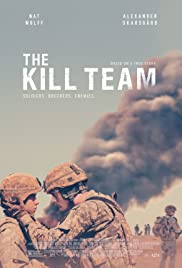
THE KILL TEAM
US, 2019, 87 minutes, Colour.
Nat Wolff, Alexander Skarsgaard, Adam Long, Jonathan Whitesell, Osy Ikhile, Rob Morrow.
Directed by Dan Krauss.
This is a brief film about soldiers in Afghanistan, a focus on a special quality, the Kill Team, who go from door to door, searching out suspects, the commander having a philosophy that it was more effective to kill one Afghan, guilty or not, probably guilty, to save American lives.
The film was written and directed by Dan Krauss who had, five years earlier, made a feature length documentary about the same issue. He then decided to dramatise it for a feature film.
The film comes after a number of exposes of illegal behaviour by troops in Afghanistan. (It appeared on Netflix just after an Australian report on the behaviour of special forces was released, indicating illegal killings and foreshadowing court trials.)
Nat Wolff is an earnest young man, proudly going off to war, finding his comrades in the kill team rather blasé in their attitudes (and supporting themselves in their drugtaking). He is ambitious and wants to be in charge of the team under the commander, he is upset by what he sees, mentions this to his father who contacts the official investigating team. There are dire consequences for his commander that also for himself.
The commander of the squad is played by Alexander Skasgaard, credible in the role and his “warrior� philosophy.
An uncomfortable, but necessary, examination of true behaviour in Afghanistan – and in other theatres of war.
1. Battle? The tone? Military? Afghanistan?
2. The opening in the US, the recruits, going to war, leaving home? Afghanistan, the train and locations, the camp, accommodation, meals? The Afghan villages? The musical score?
3. The focus on Andrew, at home, talking with his father, family pride? Going into the military, his ambitions? Arrival? The team? The officer and his reprimands, urging the men to wave to the children? Standing on the mine? His death?
4. Sgt Deeks as his replacement? His experience, age, communication with his son? His speech to the men, ambiguous phrasing, his demands? His attitude towards the Afghans, that the death of one saved the deaths of many Americans? Instilling that into the squad? The death of the Afghan and the placing of the gun with his body?
5. Andrew, serious, principled, ambitious, wanting to be the leader, fighting the rifle, getting the job? His relationship with Deeks? The discussions? Deeks and his philosophy of being a warrior?
6. The men, camaraderie, drugs, banter? Wariness of Andrew? The missions, the guns, searching the houses? Andrew and the old man in the house, letting go, his later being drawn from the house, sitting quietly, his being shot?
7. The philosophy of executions with one blank bullet, so shared responsibility rather than individual?
8. Andrew, communication with his father, principals, his father contacting the investigation department? The men blaming their fellows? More and more concentration on Andrew?
9. Deeks, his threats, his being taken, Andrew being taken?
10. The information about the case, Andrew’s parents arriving, the lawyer and the question is? Andrew and three years for involuntary manslaughter? Dix and his life sentence?
11. The consequences of action if it in Afghanistan, abuses by the military, later investigations and trials?